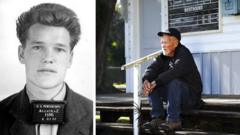Charlie Hopkins, who may be the last living inmate of Alcatraz, reflects on his time within the infamous prison walls as President Donald Trump proposes a revival of the facility. The 93-year-old recalls the eerie "deathly quiet" he experienced during his three-year sentence starting in 1955, highlighting the solitude that characterized life on Alcatraz island, isolated off the coast of San Francisco.
Jake Edwards, a journalist, has reported that the National Archives indicated Hopkins is likely the final surviving inmate from Alcatraz, although further verification remains unconfirmed. In a candid interview, Hopkins spoke of his struggles and friendships with some of America's most infamous criminals, including Al Capone and the "Birdman of Alcatraz," Robert Stroud. He reminisced about his early life of crime, which culminated in a 17-year sentence for kidnapping and robbery.
When he arrived at Alcatraz, Hopkins described the facility as clean yet devoid of diversions—no radios, limited books—leading to a daily grind spent wandering in his cell and doing push-ups to keep fit. The routine was monotonous until he found work cleaning the prison, which helped him pass the time.
Hopkins' time at Alcatraz was marked by trouble. Using hacksaw blades, he was involved in a failed escape attempt, ultimately ending up in solitary confinement for extended periods. As attempts to break free became more frequent, prison security tightened considerably, transforming Alcatraz into an even more formidable institution renowned for its ruthless conditions.
Despite being shut down in the 1960s due to mounting operational costs, Trump’s recent comments calling for the prison's reopening have sent ripples through both political and historical circles. Experts contend that the restoration costs would be astronomical, rendering Trump's plan overly ambitious.
Hopkins acknowledges the impracticality of Trump's intentions, mentioning the outdated sewage systems and structural decay that would need extensive repairs. He also believes Trump's statements might be more about making a political statement than a genuine desire to reopen a prison infamous for suffering and desperation.
Released in 1963, Hopkins reflects on his life since, including his family in Florida, where he now has grandchildren. He has penned a memoir detailing his troubled past and expresses a sense of clarity about his earlier criminal behavior. “I can see now, looking back, that I had problems,” he admits. Through his candid recollections, Hopkins provides a rare glimpse into the legacy of Alcatraz and its impact on those who lived within its walls.



















